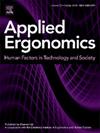Including the ergonomist's voice in integrating MSD prevention and psychological health and safety: Challenges, tools, and considerations
IF 3.1
2区 工程技术
Q2 ENGINEERING, INDUSTRIAL
引用次数: 0
Abstract
The purpose of this study was to gather ergonomists’ perspectives and experiences, describing current challenges and contextual considerations in risk assessment, exploring how ergonomists are currently integrating the multiple domains of ergonomics for MSD and/or psychological health and safety and highlighting key considerations in the design and format of future tools.
In-depth, semi-structured interviews were conducted with twenty Canadian ergonomists to explore risk assessment tool use, favoured characteristics and format of tools, commonly addressed risk factors in their practice, and tools relating to both MSD prevention and psychological health and safety. The range of practitioner years of experience highlighted differing needs and approaches to the use and formatting of risk assessment tools. Practitioners reported using quantitative outcomes (levels of risk, values) from traditional physical tools complemented by a general observation of psychosocial or organizational factors. Though many respondents had not yet encountered the need for psychological injury assessment in their sectors it was identified as a quickly emerging area citing a need for valid and reliable tools. Practitioners noted a lack of available tools that integrated cognitive and psychosocial items presenting a future challenge for integrated tools that covered multiple ergonomic domains. Along with recommendations for future tool development, the authors reflect on the process of qualitative inquiry as an essential step in the risk assessment process. Future studies will be needed to develop and evaluate measurement properties of integrating psychosocial factors and their respective tools in traditional MSD assessment.
将人体工程学专家的意见纳入 MSD 预防和心理健康与安全:挑战、工具和注意事项。
这项研究的目的是收集人体工程学专家的观点和经验,描述风险评估当前面临的挑战和背景因素,探索人体工程学专家目前如何将人体工程学的多个领域整合到MSD和/或心理健康与安全中,并强调未来工具设计和格式中的主要考虑因素。我们对二十位加拿大人体工程学专家进行了深入的半结构式访谈,以探讨风险评估工具的使用、工具的首选特征和格式、实践中常见的风险因素,以及与MSD预防和心理健康与安全相关的工具。从业人员多年的工作经验突出表明,他们对风险评估工具的使用和格式有不同的需求和方法。从业人员报告说,他们使用传统物理工具的量化结果(风险程度、价值),并辅以对社会心理或组织因素的一般观察。尽管许多受访者尚未在其所在部门遇到心理伤害评估的需求,但这被认为是一个迅速崛起的领域,需要有效和可靠的工具。从业人员指出,目前缺乏将认知和社会心理项目结合在一起的工具,这对涵盖多个人体工程学领域的综合工具提出了挑战。在对未来工具开发提出建议的同时,作者还对定性调查过程进行了反思,认为这是风险评估过程中必不可少的一步。未来的研究将需要开发和评估在传统 MSD 评估中整合社会心理因素及其相应工具的测量特性。
本文章由计算机程序翻译,如有差异,请以英文原文为准。
求助全文
约1分钟内获得全文
求助全文
来源期刊

Applied Ergonomics
工程技术-工程:工业
CiteScore
7.50
自引率
9.40%
发文量
248
审稿时长
53 days
期刊介绍:
Applied Ergonomics is aimed at ergonomists and all those interested in applying ergonomics/human factors in the design, planning and management of technical and social systems at work or leisure. Readership is truly international with subscribers in over 50 countries. Professionals for whom Applied Ergonomics is of interest include: ergonomists, designers, industrial engineers, health and safety specialists, systems engineers, design engineers, organizational psychologists, occupational health specialists and human-computer interaction specialists.
 求助内容:
求助内容: 应助结果提醒方式:
应助结果提醒方式:


